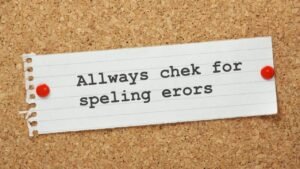Spelling errors may seem like minor issues on a website, but their impact on SEO rankings can be significant. In this article, we’ll delve into the world of SEO and explore how spelling errors affect a website’s visibility and search engine rankings.
An Overview of SEO and Its Significance

Search engine results page (SERP) optimization is the practice of making a website more search engine friendly. Businesses need to have a strong SEO strategy in place to attract organic traffic to their websites in the current digital era, where a search engine query is the first step in most online encounters.
Knowing Spelling Errors and Their Importance
Spelling errors refer to inaccuracies or mistakes in a website’s written content. These mistakes can be anything from small typos to more serious misspellings that change the meaning of a statement. Spelling mistakes can undermine a website’s authority and professionalism, even though they might not seem like much at first.
How Spelling Errors Affect User Experience
One of the primary ways spelling errors impact SEO rankings is through their effect on user experience. When visitors encounter spelling mistakes on a website, it can detract from their overall experience and diminish their perception of the site’s quality. Users may question the credibility of the content and be less likely to engage with it or return in the future.
How Does Grammar Affect Your SEO?
Grammar is crucial in SEO as it directly impacts user experience and website credibility. Well-written content with proper grammar enhances readability and comprehension, encouraging users to stay longer on your site. Consequently, this lowers bounce rates and tells search engines that your material is worthwhile and pertinent to visitors’ searches. Furthermore, grammatically correct text builds authority and trust, which affects how users view your brand. On the other hand, improper grammar might turn off readers, resulting in increased bounce rates and worse results. Consequently, using proper grammar in your content enhances user experience and boosts search engine optimization, making it a crucial part of any strategy for digital marketing.
Which terms Should I Stay Away from Using for SEO?
To optimize your SEO strategy, it’s crucial to avoid certain terms and practices that could harm your rankings. First and foremost, avoid keyword stuffing, which involves excessively repeating keywords in your content to manipulate search engines. This outdated tactic disrupts readability and violates search engine guidelines, risking penalties and lower rankings. Additionally, refrain from using irrelevant or misleading keywords that don’t accurately reflect your content. Instead, focus on utilizing relevant, high-intent keywords that align with your target audience’s search intent. Lastly, shun black hat SEO techniques such as cloaking, link schemes, and hidden text since they may result in harsh penalties and damage your website’s reputation. By staying away from these harmful methods, you can guarantee a long-lasting and successful SEO strategy that increases organic traffic and your online presence.
Does Google Consider Spelling and Grammar When Determining a Page’s Search Engine Ranking?
Yes, Google considers spelling and grammar when determining a page’s ranking. While spelling and grammar may not be direct ranking factors, they indirectly impact user experience, a significant aspect of Google’s ranking algorithms. Well-written content, free of spelling errors and grammatically correct, provides a better user experience, leading to higher engagement and lower bounce rates. On the other hand, content riddled with spelling mistakes and grammatical errors can diminish trust and credibility, resulting in poorer user engagement metrics and potentially lower search rankings. Therefore, it’s essential to prioritize spelling and grammar accuracy in your content to enhance both user experience and SEO performance.
Does SEO Ranking Take Readability Into Account?
Yes, SEO ranking does take readability into account. Search engines prioritize content that is easily understandable and accessible to users. Readability factors such as sentence structure, word choice, and paragraph length contribute to a positive user experience, impacting SEO rankings. Search engines are alerted to the relevance and value of material on websites with clear, well-organized content by the tendency of lower bounce rates and longer dwell periods. Additionally, readability enhances accessibility for all visitors, including those with disabilities or language barriers. Therefore, focusing on improving your content’s readability enhances user engagement and contributes to higher SEO rankings and improved overall website performance.
Do Spelling Mistakes Affect SEO?
Do spelling mistakes affect SEO? Absolutely. In search engine optimization (SEO), even the smallest details matter. Spelling mistakes can significantly impact your website’s SEO performance. Search engines like Google prioritize content that offers the best user experience, and impeccable spelling is crucial to user satisfaction. When users encounter spelling errors on a website, it diminishes their trust in its credibility and professionalism. This may result in lower dwell times and higher bounce rates, which search engines employ to evaluate a website’s quality and relevancy. Therefore, ensuring your content is free from spelling errors is essential for maintaining a strong SEO presence and attracting more organic traffic.
Spelling Errors and Search Engine Algorithms
Spelling errors can affect user experience and influence search engine algorithms. When ranking web sites, search engines consider several characteristics in an effort to provide consumers with the most relevant and high-quality results. Spelling errors can signal to search engines that a website may not be as trustworthy or authoritative as others, potentially leading to lower rankings in SERPs.
Which technique should be Avoided in SEO?
Avoiding black hat SEO techniques is crucial for maintaining a healthy and sustainable online presence. Black hat techniques involve manipulating search engine algorithms in ways that violate their guidelines, risking penalties and even deindexing from search results. Techniques such as keyword stuffing, cloaking, link farming, and hidden text are frowned upon by search engines and can lead to severe consequences for your website’s SEO performance. Rather, concentrate on white hat SEO tactics prioritizing ethical optimization techniques, high-quality content, and user experience . In the always-changing world of search engine optimization, you may establish a solid foundation for long-term success by following best practices and offering value to your audience.
Strategies to Detect and Correct Spelling Errors
Website owners should implement strategies to detect and correct spelling errors to mitigate their impact on SEO rankings. One approach is to proofread content thoroughly before publishing it, ensuring that spelling errors are identified and corrected. Additionally, utilizing spell-checking tools and enlisting the help of professional editors can help catch errors that may have been overlooked.
Tools for Spelling Error Prevention
Fortunately, numerous tools are available to help website owners prevent spelling errors and maintain high-quality content. Spell-checking plugins for content management systems like WordPress can automatically highlight potential errors as content is being written. Online grammar and spelling checkers also offer advanced features such as grammar suggestions and contextual spell-checking to ensure accuracy.
Case Studies of SEO Impact from Spelling Errors
Let’s examine some case studies to illustrate the real-world impact of spelling errors on SEO rankings. In one study, a website saw a noticeable decline in organic traffic after introducing multiple spelling errors into its content. Conversely, another site experienced increased rankings and traffic after conducting a thorough spell check and correcting errors.
Does the Number of Pages Affect SEO?

Yes, the number of pages on a website can impact SEO. While having a larger number of pages can potentially increase the amount of content available for search engines to index, the quality and relevance of those pages truly matter. Search engines prioritize websites that provide valuable, well-organized content that meets users’ needs. However, creating numerous low-quality or thin content pages to increase page count can hurt SEO. Concentrating on producing useful, high-quality pages that benefit your readers is critical. Furthermore, by making it simpler for search engines to index and crawl your content, improving the navigation and structure of your website will enhance search engine optimization.
Which type of Website Content can hamper SEO Rankings?
Low-quality or duplicate content can severely hamper SEO rankings. Search engines prioritize websites that offer viewers unique, captivating, and worthwhile content. When a website contains duplicate content, whether copied from other sources or replicated within the site itself, it can confuse search engines and dilute its authority and relevance. Similarly, low-quality, superficial content that doesn’t add value to the audience might result in lower user engagement metrics and increased bounce rates, which tells search engines that the website may lack quality content. If you want to remain at the top of search engine results, you must consistently produce amazing, original content that meets the needs and interests of your target audience.
Do keywords in URL Help SEO
Yes, keywords in URLs do help SEO. Including relevant keywords in your website’s URLs can positively impact your search engine optimization efforts. Search engines examine the URL structure of your website when they crawl it to determine the relevancy and content of each page. By adding specific keywords to your URLs, you give search engines important context about the content of your page, which facilitates the indexation and ranking of your website for pertinent search terms. Furthermore, by drawing more clicks from people skimming search engine results pages, keyword-rich URLs can increase your website’s exposure and organic traffic.
Conclusion
In conclusion, spelling errors may seem insignificant, but they can profoundly impact a website’s SEO rankings. By emphasizing accuracy and using techniques to identify and fix spelling errors, website owners can improve user experience and search engine visibility and eventually attract more organic traffic to their sites.
FAQ
How do Spelling Errors Affect SEO Rankings?
Spelling errors can significantly impact SEO rankings by diminishing a website’s credibility and trustworthiness in the eyes of search engines. Spelling mistakes might indicate to search engines that a piece of information lacks professionalism and accuracy, which can result in lower ranks on search engine results pages (SERPs). Search engines emphasize high-quality material.
Can Spelling Errors in non-visible Areas of a Website Still Affect SEO?
Yes, spelling errors in non-visible website areas, such as meta tags, image alt text, and HTML code, can still impact SEO. Search engine crawlers analyze all aspects of a website’s content, including hidden elements, to determine its relevance and quality. Therefore, even if spelling errors are not immediately visible to users, they can still decrease SEO rank.
Are there Tools Available to Help Detect and Correct Spelling Errors on a Website?
Yes, numerous tools are available to assist in detecting and correcting spelling errors on a website. Spell-checking plugins for content management systems (CMS), online grammar and spelling checkers, and browser extensions can help identify spelling mistakes in real-time. Additionally, website owners can utilize professional editing services to ensure their content is error-free and optimized for SEO.
Do Spelling Errors have a Greater Impact on Certain Types of Content?
Spelling errors can significantly impact all types of content, but their effect may vary depending on the context and audience. For example, spelling errors in informational or educational content may undermine the credibility of the information presented. In contrast, errors in e-commerce product descriptions may deter potential customers from purchasing. Correcting spelling mistakes is crucial for preserving a good user experience and raising SEO ranks, regardless of the type of material.


